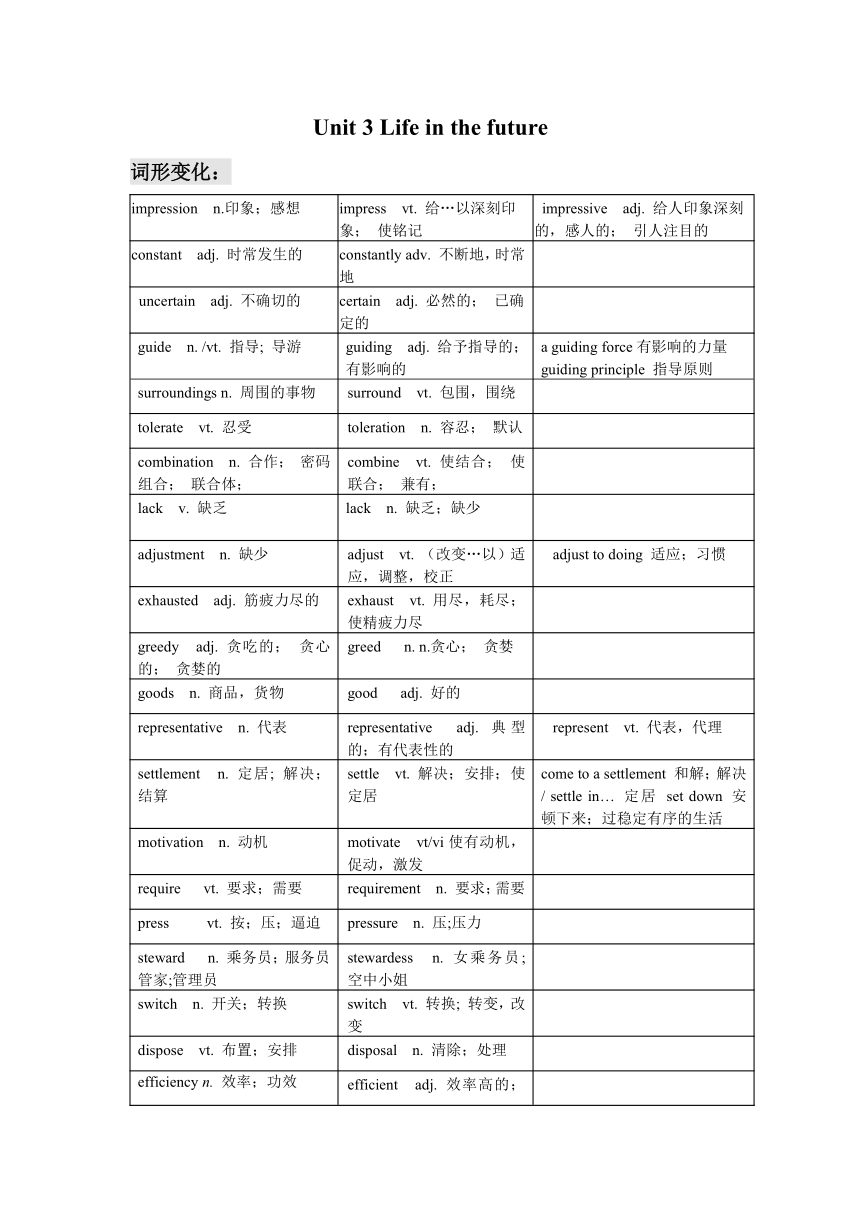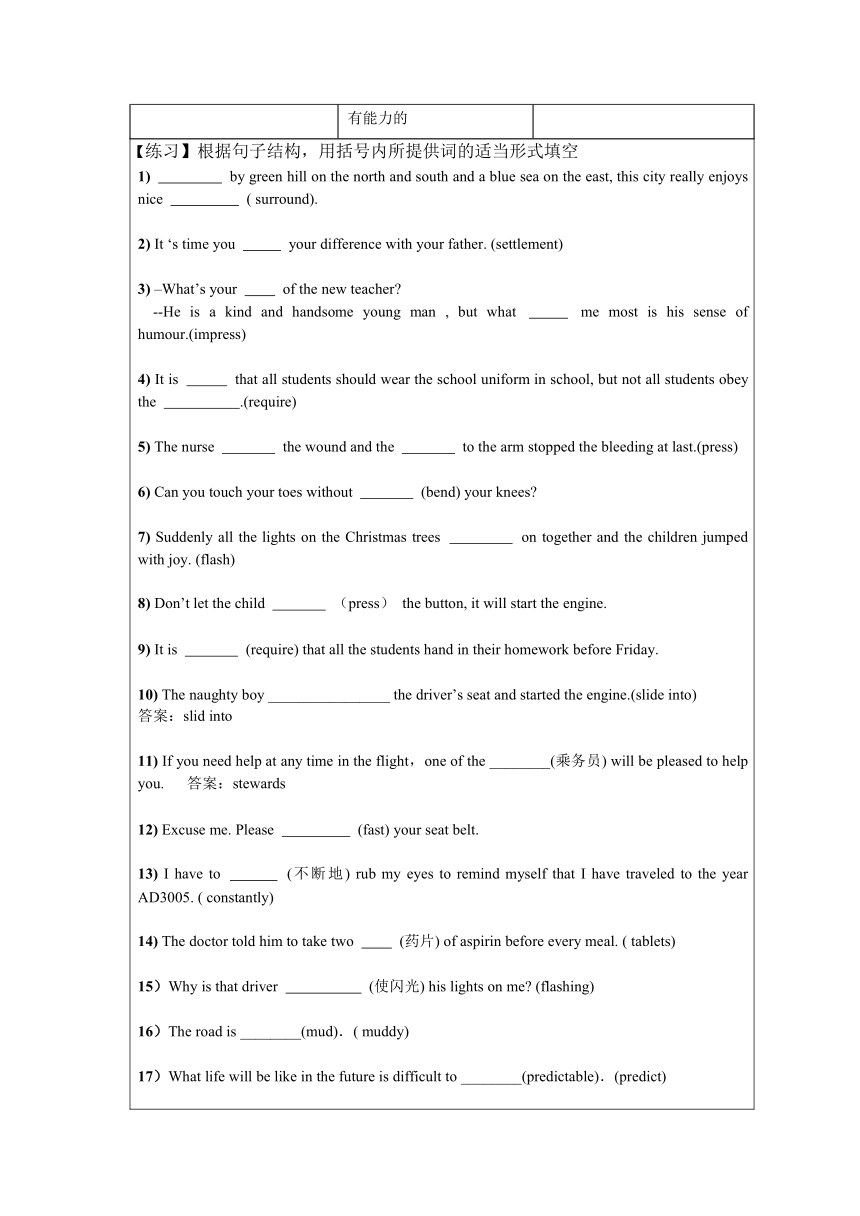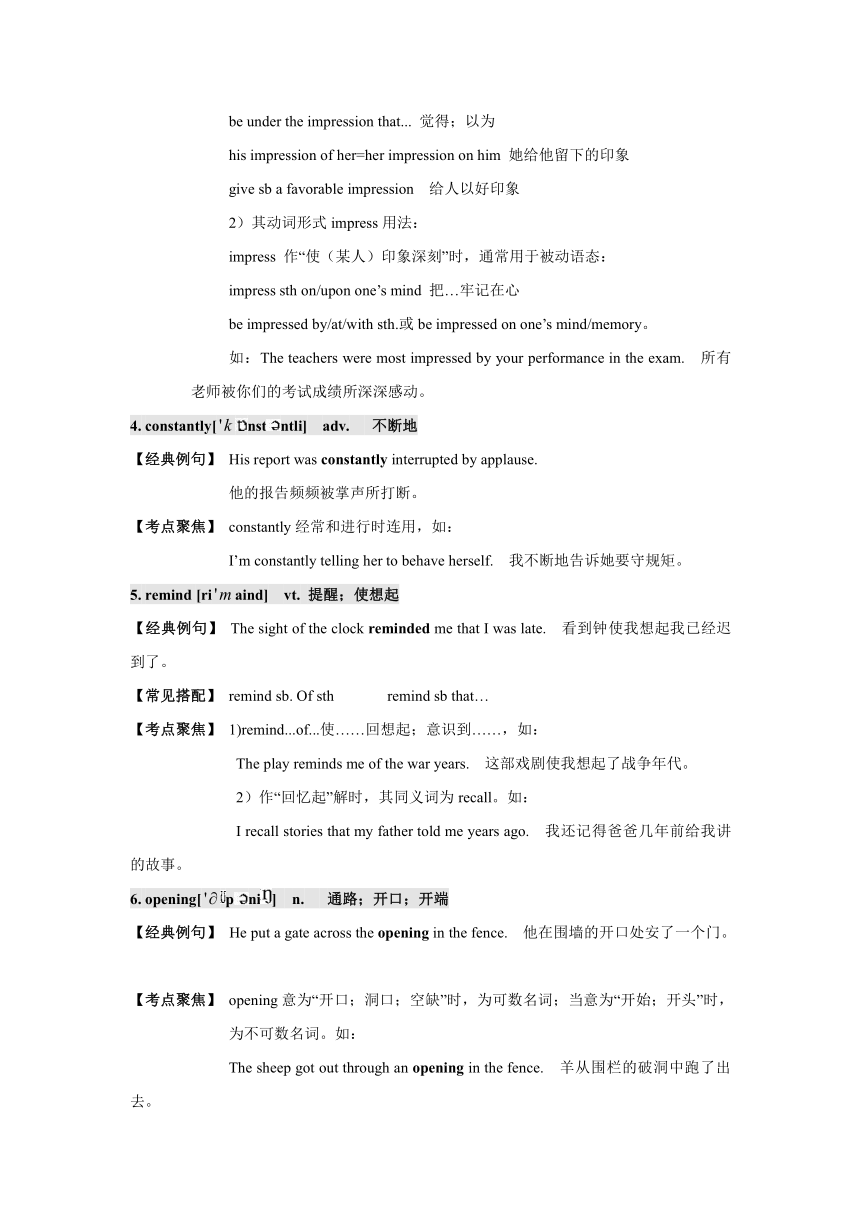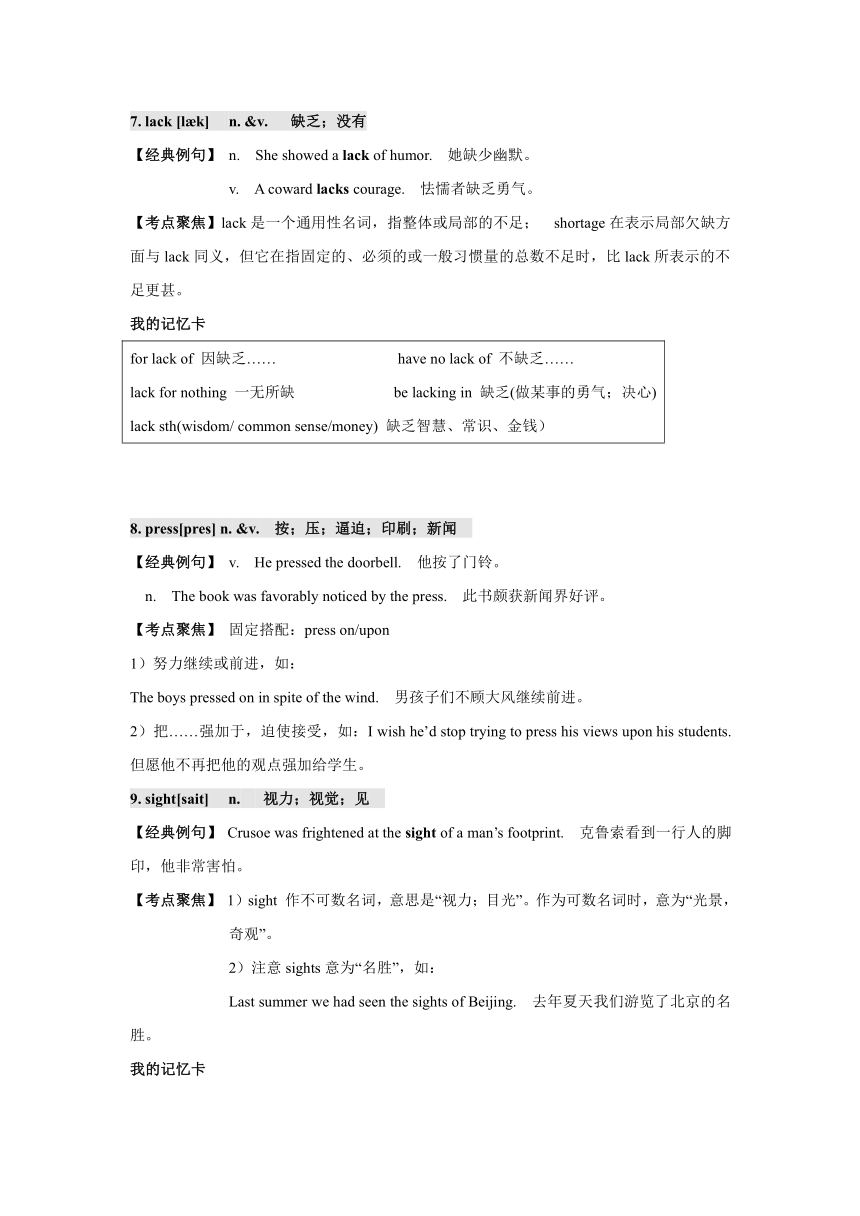人教版新课标必修5 Unit 3 Life in the future学案
文档属性
| 名称 | 人教版新课标必修5 Unit 3 Life in the future学案 |

|
|
| 格式 | zip | ||
| 文件大小 | 31.6KB | ||
| 资源类型 | 教案 | ||
| 版本资源 | 人教版(新课程标准) | ||
| 科目 | 英语 | ||
| 更新时间 | 2013-11-04 20:13:33 | ||
图片预览





文档简介
Unit 3 Life in the future
词形变化:
impression n.印象;感想
impress vt. 给…以深刻印象; 使铭记
impressive adj. 给人印象深刻的,感人的; 引人注目的
constant adj. 时常发生的
constantly adv. 不断地,时常地
uncertain adj. 不确切的
certain adj. 必然的; 已确定的
guide n. /vt. 指导; 导游
guiding adj. 给予指导的;有影响的
a guiding force有影响的力量
guiding principle 指导原则
surroundings n. 周围的事物
surround vt. 包围,围绕
tolerate vt. 忍受
toleration n. 容忍; 默认
combination n. 合作; 密码组合; 联合体;
combine vt. 使结合; 使联合; 兼有;
lack v. 缺乏
lack n. 缺乏;缺少
adjustment n. 缺少
adjust vt. (改变…以)适应,调整,校正
adjust to doing 适应;习惯
exhausted adj. 筋疲力尽的
exhaust vt. 用尽,耗尽; 使精疲力尽
greedy adj. 贪吃的; 贪心的; 贪婪的
greed n. n.贪心; 贪婪
goods n. 商品,货物
good adj. 好的
representative n. 代表
representative adj. 典型的;有代表性的
represent vt. 代表,代理
settlement n. 定居; 解决; 结算
settle vt. 解决; 安排; 使定居
come to a settlement 和解;解决/ settle in… 定居 set down 安顿下来;过稳定有序的生活
motivation n. 动机
motivate vt/vi使有动机,促动,激发
require vt. 要求;需要
requirement n. 要求;需要
press vt. 按;压;逼迫
pressure n. 压;压力
steward n. 乘务员;服务员
管家;管理员
stewardess n. 女乘务员; 空中小姐
switch n. 开关;转换
switch vt. 转换; 转变,改变
dispose vt. 布置;安排
disposal n. 清除;处理
efficiency n. 效率;功效
efficient adj. 效率高的;有能力的
【练习】根据句子结构,用括号内所提供词的适当形式填空
1) by green hill on the north and south and a blue sea on the east, this city really enjoys nice ( surround).
2) It ‘s time you your difference with your father. (settlement)
3) –What’s your of the new teacher?
--He is a kind and handsome young man , but what me most is his sense of humour.(impress)
4) It is that all students should wear the school uniform in school, but not all students obey the .(require)
5) The nurse the wound and the to the arm stopped the bleeding at last.(press)
6) Can you touch your toes without (bend) your knees?
7) Suddenly all the lights on the Christmas trees on together and the children jumped with joy. (flash)
8) Don’t let the child (press) the button, it will start the engine.
9) It is (require) that all the students hand in their homework before Friday.
10) The naughty boy ________________ the driver’s seat and started the engine.(slide into)
答案:slid into
11) If you need help at any time in the flight,one of the ________(乘务员) will be pleased to help you. 答案:stewards
12) Excuse me. Please (fast) your seat belt.
13) I have to (不断地) rub my eyes to remind myself that I have traveled to the year AD3005. ( constantly)
14) The doctor told him to take two (药片) of aspirin before every meal. ( tablets)
15)Why is that driver (使闪光) his lights on me? (flashing)
16)The road is ________(mud).( muddy)
17)What life will be like in the future is difficult to ________(predictable).(predict)
18) You can take a ________(bathroom)here. (bath)
(一)单词·巧记·典句·考点
1. vehicle[i:ikl]?n.? 交通工具;车辆
【巧记提示】 词根vect,“传送;运载”。?
【经典例句】 The street is dominated by car vehicles.?街道上满是车辆。?
【考点聚焦】 1)vehicle 特指陆地上的交通工具。?
2)vehicle还可以指“(思想、情报的)传达手段、媒介”,如:?
This radio station has become a vehicle for conservative opinion.?
3)常见同义词有conveyance ?n.?运输;财产让与;运输工具;?
carriage ?n.? 四轮马车;客车
2. private[rivit] adj.?私人的;私有的
【经典例句】 This is private parking lot, you cannot park here.?这是私人的停车点,你不能在这里停车。?
【汉英翻译】老师应该允许孩子有自己的观点。
【考点聚焦】 1)固定搭配:?
in private 秘密的;不公开的;私下的反义词:in public 公开的;公众的
2)同根词:privacy ?n.? 私生活;隐私 如:?
Telling that on TV was invasion of her privacy.?
3. impression[im]?n.? 印象;感想;印记
【经典例句】 His speech made quite an impression on the audience.?
他的演说给听众留下了相当好的印象。?
【考点聚焦】 1)固定搭配:?
leave/make/have a...impression on sb 给某人留下……印象?
be under the impression that... 觉得;以为?
his impression of her=her impression on him 她给他留下的印象?
give sb a favorable impression 给人以好印象
2)其动词形式impress用法:?
impress 作“使(某人)印象深刻”时,通常用于被动语态:?
impress sth on/upon one’s mind 把…牢记在心
be impressed by/at/with sth.或be impressed on one’s mind/memory。
如:The teachers were most impressed by your performance in the exam.?所有老师被你们的考试成绩所深深感动。
4. constantly[nstntli]?adv.? 不断地
【经典例句】 His report was constantly interrupted by applause.?
他的报告频频被掌声所打断。?
【考点聚焦】 constantly经常和进行时连用,如:?
I’m constantly telling her to behave herself.?我不断地告诉她要守规矩。
5. remind [riaind]?vt. 提醒;使想起
【经典例句】 The sight of the clock reminded me that I was late.?看到钟使我想起我已经迟到了。?
【常见搭配】 remind sb. Of sth remind sb that…
【考点聚焦】 1)remind...of...使……回想起;意识到……,如:?
The play reminds me of the war years.?这部戏剧使我想起了战争年代。?
2)作“回忆起”解时,其同义词为recall。如:?
I recall stories that my father told me years ago.?我还记得爸爸几年前给我讲的故事。
6. opening[pni] n.? 通路;开口;开端
【经典例句】 He put a gate across the opening in the fence.?他在围墙的开口处安了一个门。?
【考点聚焦】 opening意为“开口;洞口;空缺”时,为可数名词;当意为“开始;开头”时,为不可数名词。如:?
The sheep got out through an opening in the fence.?羊从围栏的破洞中跑了出去。
7. lack [l?k]? n. &v.? 缺乏;没有
【经典例句】 n.?She showed a lack of humor.?她缺少幽默。?
?v.?A coward lacks courage.?怯懦者缺乏勇气。?
【考点聚焦】lack是一个通用性名词,指整体或局部的不足;?shortage在表示局部欠缺方面与lack同义,但它在指固定的、必须的或一般习惯量的总数不足时,比lack所表示的不足更甚。
我的记忆卡
for lack of 因缺乏…… have no lack of 不缺乏……
lack for nothing 一无所缺 be lacking in 缺乏(做某事的勇气;决心)
lack sth(wisdom/ common sense/money) 缺乏智慧、常识、金钱)
8. press[pres] n. &v.?按;压;逼迫;印刷;新闻?
【经典例句】 v.?He pressed the doorbell.?他按了门铃。?
?n.?The book was favorably noticed by the press.?此书颇获新闻界好评。?
【考点聚焦】 固定搭配:press on/upon?
1)努力继续或前进,如:?
The boys pressed on in spite of the wind.?男孩子们不顾大风继续前进。?
2)把……强加于,迫使接受,如:I wish he’d stop trying to press his views upon his students.但愿他不再把他的观点强加给学生。
9. sight[sait] ?n.? 视力;视觉;见?
【经典例句】 Crusoe was frightened at the sight of a man’s footprint.?克鲁索看到一行人的脚印,他非常害怕。?
【考点聚焦】 1)sight 作不可数名词,意思是“视力;目光”。作为可数名词时,意为“光景,奇观”。?
2)注意sights意为“名胜”,如:?
Last summer we had seen the sights of Beijing.?去年夏天我们游览了北京的名胜。
我的记忆卡
与sight相关的词组?
lose one’s sight 失明 catch sight of 看见?
lose sight of 看不见 in sight 看得见?
out of sight 看不见 at the sight of 一看见……
10. assist[ist] ?vi.&vt?.帮助;援助;协助
【经典例句】 We all assisted in mending the roof.?我们都帮忙修理屋顶。?
【考点聚焦】 同根词:assistance n.?帮助;援助;assistant ?n.?助手;助理
我的记忆卡
和assist相关的词组?
assist(sb.) in/with sth.辅助(某人)某事?
assist(sb.) in doing sth.辅助(某人)做某事?
assist(sb.) to do sth.辅助(某人)做某事
11. require[riwai] ?vt.? 需要;要求;命令
【巧记提示】 词根:quest,表示“要求;需要”。?
【经典例句】 All cars require servicing regularly.?所有汽车都需要定期检修。?
【考点聚焦】 1)固定搭配:require sth.(of sb.)命令,指示,如:?
I will do everything that is required of me.?凡是要求我的事,我都会办到。?
2)其他用法:?
require 接宾语从句时,宾语从句须用should do的形式,其中should 可以省略。如:??
The situation requires that I(should) be there.?形势需要我去那儿。
12. previous adj. 以前的;先的
【常见搭配】 previous to 在…之前
【经典例句】 1)He did better in his previous study.
2)His previous attempt was successful.
3) Previous to the conference we had discussed the matter.
4) It happened previous to his arrival there.事件发生于他到那儿以前
【汉英翻译】 来这里之前,我为你准备了文件。
Previous to coming here, I prepared all the documents for you.
(二)短语·巧记·典句·考点
1. take up 拿起;接受;开始;继续?
【巧记提示】 take(拿)+up(起)?
【经典例句】 Take care not to take up the hot coals with your bare hands.?小心不要光着手去拿热煤块。?
【考点聚焦】 相关短语:take up with 与……交往;与……鬼混;就……请教…… 如: Bob’s parents were alarmed to find that he had taken up with a group of very rough boys.?
鲍勃的父母吃惊地发现他和一群粗野的男孩厮混在一起。
2. as a result(of)结果;由于……的结果?
【经典例句】 He worked hard,and as a result,he got promoted quickly.?他工作努力,被提拔得很快。?
【考点聚焦】 1)as a result(of)的用法:?
as a result 不是连词,只能作状语。如:?
He was late as a result of the traffic jam.?=There was a traffic jam. As a result,he was late.?
由于交通阻塞,他迟到了。?
as a result of 只能接名词、代词、动名词及what 引导的宾语从句。如:
He was late for school as a result of a serious traffic jam.?
我的记忆卡
常见短语?
in the result 结果是 with the result that 为此;因此?
without result 毫无结果;徒劳 result in/lead to 结果为……;终归;导致
result from/lie in 因为;源自
3. sweep up 打扫;横扫?
【经典例句】 Did you sweep up all the broken glass??你把打碎的玻璃全扫起来了吗??
【考点聚焦】 sweep up 意为“打扫;清扫”,经常引申为“横扫;掠过;拥向”。如:?
The strong wind swept up the leaves off the street.?大风把街上的树叶一扫而光。
4. speed up 加速?
【经典例句】 The car sped up when there was no one.?没有人时汽车加速了。?
【考点聚焦】 和speed搭配的常见短语:?
at a speed of 以……的速度?with speed 快速地?
at full/top speed 全速地
5. lose sight of... 不再看见……?
【巧记提示】 lose(失去)+sight(视力)+of ?
【经典例句】 Almost in a flash, I lost sight of the creature.?几乎是一刹那间,那个东西在我的眼前消失了。【考点聚焦】 反义短语:catch/gain/get sight of 瞥见;看见
(三)句子·剖析·拓展
1. The air seemed thin as though its combination of gases had little oxygen left.
空气似乎很稀薄,好像在混合的气体中剩下的氧气很少。?
【剖析】 1)本句是由方式状语从句构成的复合句。?
2)as though引导方式状语从句,as though/if“好像;似乎”,如:?
The animal was walking as though it had hurt its leg.?这动物走路的样子好像伤了腿似的。?
3)The air seemed thin是主句。主句是系表结构:seem是连系动词,thin是形容词在句子中充当表语。
【拓展】 as though/if作连词用时,通常用虚拟语气,表示与事实不符或相反的情况。如果表示与现在事实相反,谓语用did或were,如与过去事实相反,则用过去完成时。还可用真实语气。如:?
The pen as though (if) is mine.?这枝钢笔好像是我的。
2. If you cover something with a little of that liquid it will go soft...?
如果你把这种液体抹在某个东西上一点,它就会软化……?
【剖析】 1)本句是由条件状语从句构成的复合句。?
2)if引导的是条件状语从句,通常用一般现在时表将来。如:?
She will play the piano only if she is paid.?只有付给她报酬,她才愿意演奏钢琴。?
3)“It will go soft.”是主句,本句是系表结构,go是连系动词,soft是形容词作表语。?
【拓展】 go作连系动词,意为“变得(如何)”,后接形容词作表语,表示情况的变化并非人们所期望的。如:?He has gone mad.他疯了。
3. The mu-mu drink is a strange mixture of carrot juice and cocoa,while the Dimpods drink lemonade mixed with herbs.?
这是一种胡萝卜汁加可可粉的奇妙混合液,而丁泼兹喝的是含有香草的柠檬水。?
【剖析】 1)整个句子是由两个分句构成的并列句,while是并列连词。?
2)第一个分句是简单的主系表结构;第二个分句是主谓宾结构。?
3)在第一个分句中“of carrot juice and cocoa”是mixture的后置定语;第二个分句中过去分词短语“mixed with herbs”是lemonade的后置定语。?
【拓展】 1)while作为并列连词时,意为“而,然而,但是”,往往表示前后两个分句的对比。?
2)while作连词,意为“……的时候”时,从句谓语要用延续性动词。?
3)while作连词,意为“虽然”时,其用法与although相同。
4. The Dimpods have so many arms and legs that you cannot tell which is which.?
丁泼兹长着许许多多的手臂和腿,以至于你很难分清哪些是手臂哪些是腿。?
【剖析】 1)整个句子是由“so...that...”引导的复合句。?
2)“The Dimpods have(so)many arms and legs”是主句,“(that)you cannot tell which is which”是结果状语从句。?
3)that在本句中被省略。一般来说,that在口语中有时会被省略,书面语中不省略为宜。?
【拓展】 结果状语从句常由“so...that”或“such...that”引导,掌握这两个句型,首先要了解so 和 such与其后的词的搭配规律。?
1)比较:so和 such?
such 是形容词,修饰名词或名词词组;so 是副词,只能修饰形容词或副词。如:
so nice a flower such a nice flower?
2)so 还可与表示数量的形容词如many, few, much, little等连用,形成固定搭配。如:?so many/few flowers so much/little money?
3)so...that与such...that之间的转换实际上就是 so与such之间的转换。如:
The boy is so young that he can’t go to school.?
=He is such a young boy that he can’t go to school.?
这个男孩太小了,以至于不能上学。
语法·剖析?
本单元的主要语法项目是过去分词作状语和定语。?
一、过去分词?
过去分词有两大特点:一是表被动的概念;二是表动作已完成。过去分词在句中可用作定语、表语、宾语补足语或状语等成分。过去分词在句中作某种成分时,其逻辑主语一般为该分词所表示的动作的承受者。?
二、过去分词作状语的用法?
过去分词或过去分词短语常用于以下几种状语:?
分类
说明
举例
时间状语
可用于时间状语从句,也可在过去分
词前加上连词“when,while,until”
等,使其时间意义更明确。
1)Seen from the hill,the park looks very beautiful.?
=When it is seen from the hill,the parks are very beautiful.?
从山上看,这个公园非常美丽。?
2)Don’t speak until spoken to.?
=Don’t speak until you are spoken to.?
当别人和你讲话时,你才能讲话。
原因状语
可用于原因状语从句或并列结构。
Touched by his teacher’s words,the boy cried.
=The boy was touched by his teacher’s words,so he cried.?
这个男孩被老师的话打动了,所以他哭了。
条件状语
可加连词if,unless等转换成条件状语从句。
Given more time,we could do it much better.
(=If we were given more time,we could do it much better.)?
多给我们点时间,我们会做得更好。
让步状语
有时可加although,though,even if,even though,whether...or等连词转换成让步状语从句。
Though warned of the storm,the farmers were still working in the fields.?
=Though they had been warned of the storm, the farmers were still working in the fields.?
虽然农民们已被告知将有风暴,但他们仍然在地里干活。
方式伴
随状语
加and可转换成并列结构从句。
The teacher entered the classroom,followed by a group of his students.
=The teacher entered the classroom and he was followed by a group of his students.?
老师走进教室,后面跟着一群学生。
三、学习过去分词作定语时,注意过去分词所在的位置?
单独的过去分词作定语
常常置于其所修饰的名词前
You should improve your
spoken English.
过去分词短语作定语
常常置于其所修饰的名词后
He is a teacher respected
by all his students.
不及物动词的过去分词作定语
当与其所修饰的名词构成逻
辑上的动宾关系时,必须在该
动词后使用必要的介词
He is the student laughed
at by all people just now.
词形变化:
impression n.印象;感想
impress vt. 给…以深刻印象; 使铭记
impressive adj. 给人印象深刻的,感人的; 引人注目的
constant adj. 时常发生的
constantly adv. 不断地,时常地
uncertain adj. 不确切的
certain adj. 必然的; 已确定的
guide n. /vt. 指导; 导游
guiding adj. 给予指导的;有影响的
a guiding force有影响的力量
guiding principle 指导原则
surroundings n. 周围的事物
surround vt. 包围,围绕
tolerate vt. 忍受
toleration n. 容忍; 默认
combination n. 合作; 密码组合; 联合体;
combine vt. 使结合; 使联合; 兼有;
lack v. 缺乏
lack n. 缺乏;缺少
adjustment n. 缺少
adjust vt. (改变…以)适应,调整,校正
adjust to doing 适应;习惯
exhausted adj. 筋疲力尽的
exhaust vt. 用尽,耗尽; 使精疲力尽
greedy adj. 贪吃的; 贪心的; 贪婪的
greed n. n.贪心; 贪婪
goods n. 商品,货物
good adj. 好的
representative n. 代表
representative adj. 典型的;有代表性的
represent vt. 代表,代理
settlement n. 定居; 解决; 结算
settle vt. 解决; 安排; 使定居
come to a settlement 和解;解决/ settle in… 定居 set down 安顿下来;过稳定有序的生活
motivation n. 动机
motivate vt/vi使有动机,促动,激发
require vt. 要求;需要
requirement n. 要求;需要
press vt. 按;压;逼迫
pressure n. 压;压力
steward n. 乘务员;服务员
管家;管理员
stewardess n. 女乘务员; 空中小姐
switch n. 开关;转换
switch vt. 转换; 转变,改变
dispose vt. 布置;安排
disposal n. 清除;处理
efficiency n. 效率;功效
efficient adj. 效率高的;有能力的
【练习】根据句子结构,用括号内所提供词的适当形式填空
1) by green hill on the north and south and a blue sea on the east, this city really enjoys nice ( surround).
2) It ‘s time you your difference with your father. (settlement)
3) –What’s your of the new teacher?
--He is a kind and handsome young man , but what me most is his sense of humour.(impress)
4) It is that all students should wear the school uniform in school, but not all students obey the .(require)
5) The nurse the wound and the to the arm stopped the bleeding at last.(press)
6) Can you touch your toes without (bend) your knees?
7) Suddenly all the lights on the Christmas trees on together and the children jumped with joy. (flash)
8) Don’t let the child (press) the button, it will start the engine.
9) It is (require) that all the students hand in their homework before Friday.
10) The naughty boy ________________ the driver’s seat and started the engine.(slide into)
答案:slid into
11) If you need help at any time in the flight,one of the ________(乘务员) will be pleased to help you. 答案:stewards
12) Excuse me. Please (fast) your seat belt.
13) I have to (不断地) rub my eyes to remind myself that I have traveled to the year AD3005. ( constantly)
14) The doctor told him to take two (药片) of aspirin before every meal. ( tablets)
15)Why is that driver (使闪光) his lights on me? (flashing)
16)The road is ________(mud).( muddy)
17)What life will be like in the future is difficult to ________(predictable).(predict)
18) You can take a ________(bathroom)here. (bath)
(一)单词·巧记·典句·考点
1. vehicle[i:ikl]?n.? 交通工具;车辆
【巧记提示】 词根vect,“传送;运载”。?
【经典例句】 The street is dominated by car vehicles.?街道上满是车辆。?
【考点聚焦】 1)vehicle 特指陆地上的交通工具。?
2)vehicle还可以指“(思想、情报的)传达手段、媒介”,如:?
This radio station has become a vehicle for conservative opinion.?
3)常见同义词有conveyance ?n.?运输;财产让与;运输工具;?
carriage ?n.? 四轮马车;客车
2. private[rivit] adj.?私人的;私有的
【经典例句】 This is private parking lot, you cannot park here.?这是私人的停车点,你不能在这里停车。?
【汉英翻译】老师应该允许孩子有自己的观点。
【考点聚焦】 1)固定搭配:?
in private 秘密的;不公开的;私下的反义词:in public 公开的;公众的
2)同根词:privacy ?n.? 私生活;隐私 如:?
Telling that on TV was invasion of her privacy.?
3. impression[im]?n.? 印象;感想;印记
【经典例句】 His speech made quite an impression on the audience.?
他的演说给听众留下了相当好的印象。?
【考点聚焦】 1)固定搭配:?
leave/make/have a...impression on sb 给某人留下……印象?
be under the impression that... 觉得;以为?
his impression of her=her impression on him 她给他留下的印象?
give sb a favorable impression 给人以好印象
2)其动词形式impress用法:?
impress 作“使(某人)印象深刻”时,通常用于被动语态:?
impress sth on/upon one’s mind 把…牢记在心
be impressed by/at/with sth.或be impressed on one’s mind/memory。
如:The teachers were most impressed by your performance in the exam.?所有老师被你们的考试成绩所深深感动。
4. constantly[nstntli]?adv.? 不断地
【经典例句】 His report was constantly interrupted by applause.?
他的报告频频被掌声所打断。?
【考点聚焦】 constantly经常和进行时连用,如:?
I’m constantly telling her to behave herself.?我不断地告诉她要守规矩。
5. remind [riaind]?vt. 提醒;使想起
【经典例句】 The sight of the clock reminded me that I was late.?看到钟使我想起我已经迟到了。?
【常见搭配】 remind sb. Of sth remind sb that…
【考点聚焦】 1)remind...of...使……回想起;意识到……,如:?
The play reminds me of the war years.?这部戏剧使我想起了战争年代。?
2)作“回忆起”解时,其同义词为recall。如:?
I recall stories that my father told me years ago.?我还记得爸爸几年前给我讲的故事。
6. opening[pni] n.? 通路;开口;开端
【经典例句】 He put a gate across the opening in the fence.?他在围墙的开口处安了一个门。?
【考点聚焦】 opening意为“开口;洞口;空缺”时,为可数名词;当意为“开始;开头”时,为不可数名词。如:?
The sheep got out through an opening in the fence.?羊从围栏的破洞中跑了出去。
7. lack [l?k]? n. &v.? 缺乏;没有
【经典例句】 n.?She showed a lack of humor.?她缺少幽默。?
?v.?A coward lacks courage.?怯懦者缺乏勇气。?
【考点聚焦】lack是一个通用性名词,指整体或局部的不足;?shortage在表示局部欠缺方面与lack同义,但它在指固定的、必须的或一般习惯量的总数不足时,比lack所表示的不足更甚。
我的记忆卡
for lack of 因缺乏…… have no lack of 不缺乏……
lack for nothing 一无所缺 be lacking in 缺乏(做某事的勇气;决心)
lack sth(wisdom/ common sense/money) 缺乏智慧、常识、金钱)
8. press[pres] n. &v.?按;压;逼迫;印刷;新闻?
【经典例句】 v.?He pressed the doorbell.?他按了门铃。?
?n.?The book was favorably noticed by the press.?此书颇获新闻界好评。?
【考点聚焦】 固定搭配:press on/upon?
1)努力继续或前进,如:?
The boys pressed on in spite of the wind.?男孩子们不顾大风继续前进。?
2)把……强加于,迫使接受,如:I wish he’d stop trying to press his views upon his students.但愿他不再把他的观点强加给学生。
9. sight[sait] ?n.? 视力;视觉;见?
【经典例句】 Crusoe was frightened at the sight of a man’s footprint.?克鲁索看到一行人的脚印,他非常害怕。?
【考点聚焦】 1)sight 作不可数名词,意思是“视力;目光”。作为可数名词时,意为“光景,奇观”。?
2)注意sights意为“名胜”,如:?
Last summer we had seen the sights of Beijing.?去年夏天我们游览了北京的名胜。
我的记忆卡
与sight相关的词组?
lose one’s sight 失明 catch sight of 看见?
lose sight of 看不见 in sight 看得见?
out of sight 看不见 at the sight of 一看见……
10. assist[ist] ?vi.&vt?.帮助;援助;协助
【经典例句】 We all assisted in mending the roof.?我们都帮忙修理屋顶。?
【考点聚焦】 同根词:assistance n.?帮助;援助;assistant ?n.?助手;助理
我的记忆卡
和assist相关的词组?
assist(sb.) in/with sth.辅助(某人)某事?
assist(sb.) in doing sth.辅助(某人)做某事?
assist(sb.) to do sth.辅助(某人)做某事
11. require[riwai] ?vt.? 需要;要求;命令
【巧记提示】 词根:quest,表示“要求;需要”。?
【经典例句】 All cars require servicing regularly.?所有汽车都需要定期检修。?
【考点聚焦】 1)固定搭配:require sth.(of sb.)命令,指示,如:?
I will do everything that is required of me.?凡是要求我的事,我都会办到。?
2)其他用法:?
require 接宾语从句时,宾语从句须用should do的形式,其中should 可以省略。如:??
The situation requires that I(should) be there.?形势需要我去那儿。
12. previous adj. 以前的;先的
【常见搭配】 previous to 在…之前
【经典例句】 1)He did better in his previous study.
2)His previous attempt was successful.
3) Previous to the conference we had discussed the matter.
4) It happened previous to his arrival there.事件发生于他到那儿以前
【汉英翻译】 来这里之前,我为你准备了文件。
Previous to coming here, I prepared all the documents for you.
(二)短语·巧记·典句·考点
1. take up 拿起;接受;开始;继续?
【巧记提示】 take(拿)+up(起)?
【经典例句】 Take care not to take up the hot coals with your bare hands.?小心不要光着手去拿热煤块。?
【考点聚焦】 相关短语:take up with 与……交往;与……鬼混;就……请教…… 如: Bob’s parents were alarmed to find that he had taken up with a group of very rough boys.?
鲍勃的父母吃惊地发现他和一群粗野的男孩厮混在一起。
2. as a result(of)结果;由于……的结果?
【经典例句】 He worked hard,and as a result,he got promoted quickly.?他工作努力,被提拔得很快。?
【考点聚焦】 1)as a result(of)的用法:?
as a result 不是连词,只能作状语。如:?
He was late as a result of the traffic jam.?=There was a traffic jam. As a result,he was late.?
由于交通阻塞,他迟到了。?
as a result of 只能接名词、代词、动名词及what 引导的宾语从句。如:
He was late for school as a result of a serious traffic jam.?
我的记忆卡
常见短语?
in the result 结果是 with the result that 为此;因此?
without result 毫无结果;徒劳 result in/lead to 结果为……;终归;导致
result from/lie in 因为;源自
3. sweep up 打扫;横扫?
【经典例句】 Did you sweep up all the broken glass??你把打碎的玻璃全扫起来了吗??
【考点聚焦】 sweep up 意为“打扫;清扫”,经常引申为“横扫;掠过;拥向”。如:?
The strong wind swept up the leaves off the street.?大风把街上的树叶一扫而光。
4. speed up 加速?
【经典例句】 The car sped up when there was no one.?没有人时汽车加速了。?
【考点聚焦】 和speed搭配的常见短语:?
at a speed of 以……的速度?with speed 快速地?
at full/top speed 全速地
5. lose sight of... 不再看见……?
【巧记提示】 lose(失去)+sight(视力)+of ?
【经典例句】 Almost in a flash, I lost sight of the creature.?几乎是一刹那间,那个东西在我的眼前消失了。【考点聚焦】 反义短语:catch/gain/get sight of 瞥见;看见
(三)句子·剖析·拓展
1. The air seemed thin as though its combination of gases had little oxygen left.
空气似乎很稀薄,好像在混合的气体中剩下的氧气很少。?
【剖析】 1)本句是由方式状语从句构成的复合句。?
2)as though引导方式状语从句,as though/if“好像;似乎”,如:?
The animal was walking as though it had hurt its leg.?这动物走路的样子好像伤了腿似的。?
3)The air seemed thin是主句。主句是系表结构:seem是连系动词,thin是形容词在句子中充当表语。
【拓展】 as though/if作连词用时,通常用虚拟语气,表示与事实不符或相反的情况。如果表示与现在事实相反,谓语用did或were,如与过去事实相反,则用过去完成时。还可用真实语气。如:?
The pen as though (if) is mine.?这枝钢笔好像是我的。
2. If you cover something with a little of that liquid it will go soft...?
如果你把这种液体抹在某个东西上一点,它就会软化……?
【剖析】 1)本句是由条件状语从句构成的复合句。?
2)if引导的是条件状语从句,通常用一般现在时表将来。如:?
She will play the piano only if she is paid.?只有付给她报酬,她才愿意演奏钢琴。?
3)“It will go soft.”是主句,本句是系表结构,go是连系动词,soft是形容词作表语。?
【拓展】 go作连系动词,意为“变得(如何)”,后接形容词作表语,表示情况的变化并非人们所期望的。如:?He has gone mad.他疯了。
3. The mu-mu drink is a strange mixture of carrot juice and cocoa,while the Dimpods drink lemonade mixed with herbs.?
这是一种胡萝卜汁加可可粉的奇妙混合液,而丁泼兹喝的是含有香草的柠檬水。?
【剖析】 1)整个句子是由两个分句构成的并列句,while是并列连词。?
2)第一个分句是简单的主系表结构;第二个分句是主谓宾结构。?
3)在第一个分句中“of carrot juice and cocoa”是mixture的后置定语;第二个分句中过去分词短语“mixed with herbs”是lemonade的后置定语。?
【拓展】 1)while作为并列连词时,意为“而,然而,但是”,往往表示前后两个分句的对比。?
2)while作连词,意为“……的时候”时,从句谓语要用延续性动词。?
3)while作连词,意为“虽然”时,其用法与although相同。
4. The Dimpods have so many arms and legs that you cannot tell which is which.?
丁泼兹长着许许多多的手臂和腿,以至于你很难分清哪些是手臂哪些是腿。?
【剖析】 1)整个句子是由“so...that...”引导的复合句。?
2)“The Dimpods have(so)many arms and legs”是主句,“(that)you cannot tell which is which”是结果状语从句。?
3)that在本句中被省略。一般来说,that在口语中有时会被省略,书面语中不省略为宜。?
【拓展】 结果状语从句常由“so...that”或“such...that”引导,掌握这两个句型,首先要了解so 和 such与其后的词的搭配规律。?
1)比较:so和 such?
such 是形容词,修饰名词或名词词组;so 是副词,只能修饰形容词或副词。如:
so nice a flower such a nice flower?
2)so 还可与表示数量的形容词如many, few, much, little等连用,形成固定搭配。如:?so many/few flowers so much/little money?
3)so...that与such...that之间的转换实际上就是 so与such之间的转换。如:
The boy is so young that he can’t go to school.?
=He is such a young boy that he can’t go to school.?
这个男孩太小了,以至于不能上学。
语法·剖析?
本单元的主要语法项目是过去分词作状语和定语。?
一、过去分词?
过去分词有两大特点:一是表被动的概念;二是表动作已完成。过去分词在句中可用作定语、表语、宾语补足语或状语等成分。过去分词在句中作某种成分时,其逻辑主语一般为该分词所表示的动作的承受者。?
二、过去分词作状语的用法?
过去分词或过去分词短语常用于以下几种状语:?
分类
说明
举例
时间状语
可用于时间状语从句,也可在过去分
词前加上连词“when,while,until”
等,使其时间意义更明确。
1)Seen from the hill,the park looks very beautiful.?
=When it is seen from the hill,the parks are very beautiful.?
从山上看,这个公园非常美丽。?
2)Don’t speak until spoken to.?
=Don’t speak until you are spoken to.?
当别人和你讲话时,你才能讲话。
原因状语
可用于原因状语从句或并列结构。
Touched by his teacher’s words,the boy cried.
=The boy was touched by his teacher’s words,so he cried.?
这个男孩被老师的话打动了,所以他哭了。
条件状语
可加连词if,unless等转换成条件状语从句。
Given more time,we could do it much better.
(=If we were given more time,we could do it much better.)?
多给我们点时间,我们会做得更好。
让步状语
有时可加although,though,even if,even though,whether...or等连词转换成让步状语从句。
Though warned of the storm,the farmers were still working in the fields.?
=Though they had been warned of the storm, the farmers were still working in the fields.?
虽然农民们已被告知将有风暴,但他们仍然在地里干活。
方式伴
随状语
加and可转换成并列结构从句。
The teacher entered the classroom,followed by a group of his students.
=The teacher entered the classroom and he was followed by a group of his students.?
老师走进教室,后面跟着一群学生。
三、学习过去分词作定语时,注意过去分词所在的位置?
单独的过去分词作定语
常常置于其所修饰的名词前
You should improve your
spoken English.
过去分词短语作定语
常常置于其所修饰的名词后
He is a teacher respected
by all his students.
不及物动词的过去分词作定语
当与其所修饰的名词构成逻
辑上的动宾关系时,必须在该
动词后使用必要的介词
He is the student laughed
at by all people just now.
